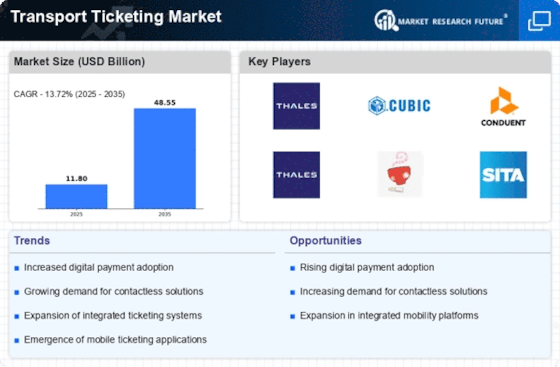Top Industry Leaders in the Transport Ticketing Market

The Competitive Landscape in the Transport Ticketing Market
The transport ticketing market is the invisible captain, steering passengers across cities and continents with a tap, swipe, or scan. This dynamic market presents a fascinating interplay between established players, nimble startups, and the relentless march of technological advancements. Let's delve into the strategies adopted by leaders, the critical factors influencing market share analysis, the emergence of exciting new entrants, and the overall competitive scenario driving this vital market.
Key Player:
- HID
- Gemalto NV
- NXP Semiconductors
- Accenture PLC
- CPI Card Group Inc.
- Cubic Corp.
- Xerox Corp.
- AEP Ticketing Solutions
- Rambus Incorporated
- Infineon Technologies AG
Strategies Adopted by Market Leaders:
- Technology Diversification: Masabi and Cubic Corporation embrace diverse ticketing solutions, from smart cards to mobile apps, catering to a wider range of users and transportation modes.
- Open-System Play: OpenLM and INIT offer open-loop ticketing platforms, allowing integration with multiple payment systems and transit providers, fostering ecosystem collaboration.
- Data Analytics Focus: Thales leverages data analytics to optimize ticketing systems, improve passenger experience, and generate insights for smarter transportation planning.
- Subscription and Account-Based Ticketing: National Express and Transport for London implement subscription models and account-based ticketing for seamless travel and increased customer loyalty.
- Global Reach and Partnerships: Scheidt & Bachmann establishes a global presence and partners with local transportation authorities, securing market access and scaling solutions.
Factors for Market Share Analysis:
- Technological Prowess: Companies offering advanced ticketing solutions, like contactless payments, real-time information displays, and multimodal integration, command premium pricing and secure market share.
- Cost Competitiveness: Balancing affordability with functionality is crucial for winning tenders in price-sensitive regions and attracting budget-conscious passengers.
- Integration and Interoperability: Seamless integration with existing infrastructure, different transportation modes, and various payment systems increases user adoption and market share.
- Data Security and Privacy: Robust security measures and transparent data privacy practices are essential for building trust and compliance with regulations.
- Sustainability Initiatives: Implementing green ticketing solutions like reusable smart cards and paperless validation foster market acceptance and attract environmentally conscious customers.
New and Emerging Companies:
The market is witnessing an influx of exciting startups and research institutions eager to inject fresh ideas and disrupt the established order. Examples include Citymapper and TransitLab, developing AI-powered journey planning and ticketing solutions, and Hyperloop One, focusing on next-generation high-speed transportation systems with integrated ticketing options. These new entrants, with their disruptive technologies and focus on emerging trends, are expected to further accelerate innovation and broaden the market's reach.
Industry Developments:
December 2023
- Masabi: This San Francisco-based company provides cloud-based ticketing solutions for various transit agencies worldwide. They recently partnered with New York's MTA to launch OMNY, a contactless ticketing system for the entire subway and bus network.
- Moovit: This Israeli company offers a popular transit app that provides real-time information and integrates with various ticketing systems. They recently expanded their operations to new cities across the globe and introduced multi-modal trip planning capabilities.









